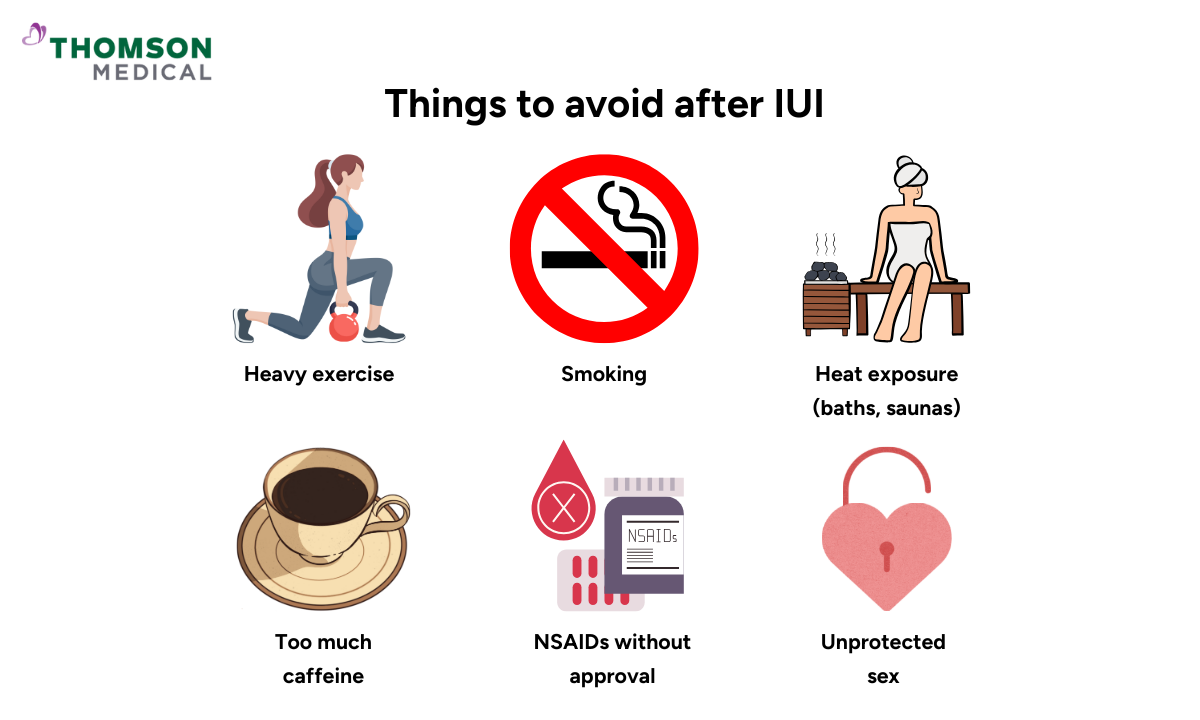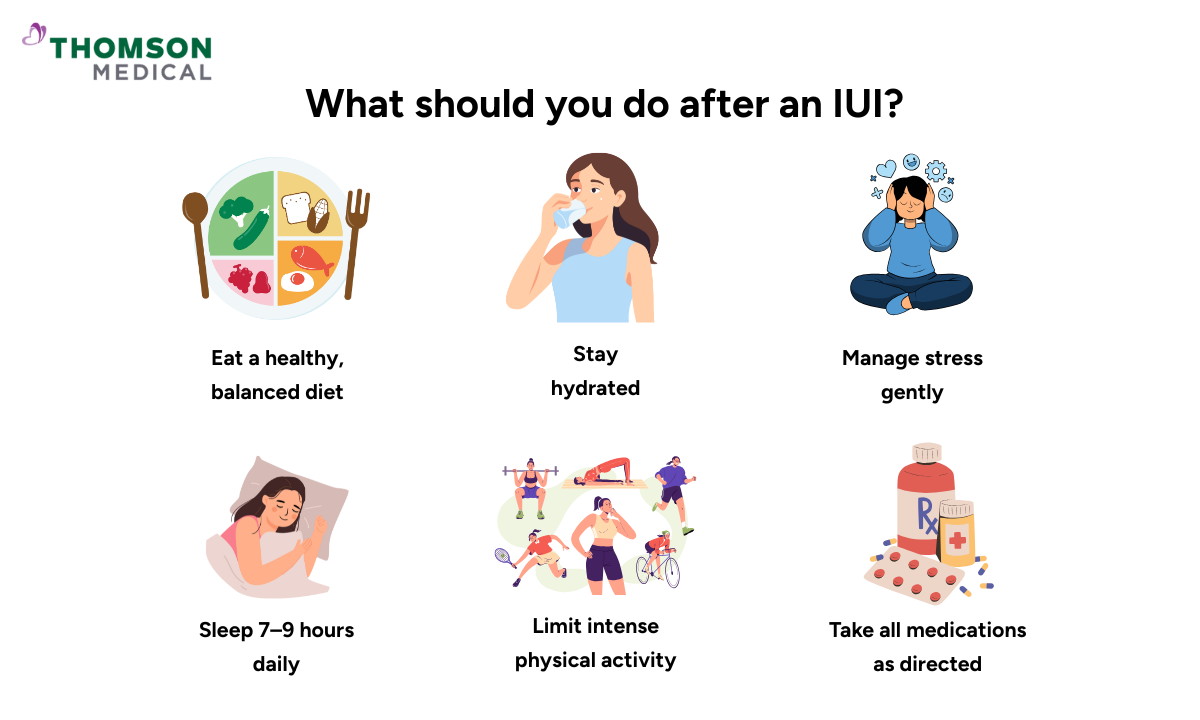After your intrauterine insemination (IUI), it’s normal to feel like you have to analyse every little thing your body does. Totally normal.
Maybe you noticed a bit of discharge and immediately thought “Wait... did the sperm just fall out?”
This is one of the most common concerns people have after IUI.
This article will explain what’s really happening inside your body after IUI—and why that wet feeling doesn’t mean the sperm has fallen out.
Can sperm fall out after IUI?
No, sperm cannot “fall out” of your body after IUI.
Intrauterine insemination (IUI) is not like natural intercourse, where sperm is deposited in the vagina and has to swim through the cervix to reach the uterus.
During IUI, the sperm is placed directly inside your uterus using a thin catheter. That means the sperm bypasses the vaginal canal and cervix completely and is much closer to the fallopian tubes.
Also, the uterus is a closed space, so once the sperm is inside, there’s no way for it to leak out.
Moreover, after being introduced to the body, the sperm are activated immediately and start swimming in the fallopian tubes, which then increases the chance that the sperm and eggs will meet for possible fertilisation.
For more information about IUI and to receive advice tailored to your unique situation, consider speaking with a fertility specialist. You may contact Thomson Medical to arrange a consultation for personalised guidance on treatment options and the next steps in your implantation procedure.
IUI specialist
Loading...
Is fluid leakage normal after IUI?
While it is completely normal to notice some fluid discharge after the procedure, here’s the key thing to remember:
This is not sperm leaking.
Only a tiny amount of sperm is used during IUI, usually around 0.2 to 0.5 ml, and it is placed directly into your uterus. What you might see coming out is just residual fluid from the procedure.
This can include:
Natural cervical mucus, which increases during ovulation
The washing media used to prepare the sperm
Lubricant applied during the process
Saline or antiseptic used to clean the cervix
This kind of discharge is completely harmless and has no effect on the success of the procedure
.png?branch=production)
Why might you feel like sperm is leaking?
That “leaking” sensation is often caused by gravity or vaginal secretions, not the sperm itself.
After IUI, your body may release some of the excess fluids from the procedure, which can create a feeling of wetness or trickling. It’s easy to mistake this for sperm leakage, but it is not.
It’s important to remember that once the sperm is inside the uterus, it stays there.
Does it affect the chance of conception?
No, this fluid discharge does not lower your chances of conception. This kind of post-IUI discharge has no impact on whether or not you conceive.
The sperm are already in place, and many begin moving toward the egg within minutes of insemination. Clinical studies show that this kind of leakage has no negative impact on pregnancy rates.
Does lying down after IUI help increase success?
Many clinics may ask you to lie down for about 10 to 15 minutes after the procedure. While this is often done for comfort or tradition, recent research suggests that lying down does not significantly improve pregnancy rates.
The sperm is already in the uterus, and once it’s there, your body’s natural processes take over. You can resume normal activity shortly after unless your doctor advises otherwise.
What to avoid after IUI?

There are a few things you should avoid in the days following your IUI procedure:
High-intensity workouts or heavy lifting for a few days:
Your body needs time to recover from the procedure
Alcohol, smoking, and recreational drugs:
These can affect your fertility and potential pregnancy
Saunas, hot baths, or jacuzzis:
Excessive heat may affect implantation
Excess caffeine:
Try to limit your coffee intake to less than 200 mg per day (about one cup of coffee)
Early pregnancy tests:
Wait 14 days post-IUI to avoid false results and unnecessary stress.
How can you support successful conception after IUI?

Nourish your body with the right foods
The foods you consume have a profound impact on the reproductive system. You should focus on a balanced diet that is abundant in vegetables, fruits, whole grains, lean protein, and healthy fats. These nutrients help support your reproductive health and provide your body with everything it needs during this important time.
Take your prescribed supplements consistently
Your doctor might have you on certain supplements like folic acid, vitamin D, or CoQ10 to help with conception and early pregnancy. Stick to exactly what they prescribed, as the timing and dosage are tailored specifically for you.
Manage stress in healthy ways
The two-week wait after an IUI procedure can feel emotionally intense. While it's normal to experience a mix of hope and anxiety, finding calm during this time can support your overall well-being.
Gentle activities like deep breathing, light yoga, listening to music, or spending time on hobbies you enjoy can help reduce stress. These calming practices may also support your body’s receptiveness to implantation and early pregnancy.
Prioritise quality sleep
Go to bed for 7–9 hours, and within these hours, make sure the quality of sleep is high. Good sleep supports endocrine system functions in reproductive processes and helps regulate the secretion of reproductive hormones. Relax and try to maintain a consistent sleep schedule by waking up at the same time each day during the wait period.
Track symptoms mindfully
It is very normal to want to keep track of your feelings; however, you should avoid overthinking every symptom and testing too frequently.
Some of the early signs of pregnancy can be very similar to the premenstrual symptoms. Also, testing earlier than 14 days after IUI may give you a false negative result and cause you unnecessary stress. If logging it helps, keep it simple, and make sure it does not turn into anxiety.
Modify your exercise routine temporarily
While staying active is important, avoid strenuous workouts, heavy lifting, or high-impact activities for the first few days after IUI. Light exercise like walking is perfectly fine and actually beneficial.
Your body needs time to recover from the procedure, and gentle movement supports good circulation without putting stress on your reproductive system.
Never skip your prescribed medications
Some IUI cycles include specific medications like progesterone to support implantation. These medications are timed precisely to work with your body's natural cycle, so it is important to take them exactly as prescribed.
Even if you're feeling okay, it's important to take your medications exactly as prescribed, as they're timed to support your body's natural rhythm and improve your chances of success.
FAQ
Is some sperm leakage normal after IUI?
Yes, it's completely normal to notice fluid leakage after IUI, but this is not the sperm itself. The actual sperm is safely positioned in your uterus where it needs to be. What you may see coming out is lubricant or saline used during the procedure, natural cervical mucus that increases around ovulation, or small amounts of the sperm washing medium used to prepare the sample. This discharge doesn't affect your chances of success at all.
How early can implantation occur after IUI?
Implantation usually happens 6 to 10 days after ovulation. Since IUI is timed with ovulation (either naturally or via trigger shot), you can expect implantation to occur around Day 6 to Day 10 after your IUI procedure. This is when a fertilised egg would attach to the lining of your uterus and begin developing into a pregnancy.
How do you know if IUI is successful?
The only way to confirm success is with a positive pregnancy test, usually taken 14 days after IUI. However, some early symptoms that may suggest pregnancy include:
Mild cramping or twinges around 7 to 10 days post-IUI
Light implantation spotting that appears pink or brown
Breast tenderness or swelling
Fatigue or mood changes
Increased urination or bloating.
It's important to remember that these symptoms can also be caused by the medications used during your IUI cycle, so a pregnancy test is the most reliable way to know for sure.
Does IUI favour boys or girls?
There's no scientific evidence that IUI consistently increases the chances of having a boy or a girl. IUI does not affect your baby's sex in any way. The gender is determined by which sperm fertilises the egg, and the probability remains a 50/50 ratio regardless of whether conception happens naturally or through IUI. The procedure simply helps the sperm reach the egg more easily but doesn't influence which type of sperm succeeds.
What are the early signs of failed IUI?
If IUI was unsuccessful, you might notice several signs around Days 12–14 post-IUI. These can include:
The absence of implantation bleeding (although not everyone experiences this even with successful pregnancies)
A return of your usual premenstrual symptoms
Spotting or bleeding before your expected period
Menstrual-like cramps around day 12–14 post-IUI
A negative pregnancy test at 14 days post-IUI
However, it's important to wait for the full 14 days before testing, as earlier tests may give false negatives.
How soon after a failed IUI can you try again?
You can usually try again as soon as your next menstrual cycle starts. Most doctors allow back-to-back IUI cycles unless you had an ovarian over-response that puts you at risk of OHSS (ovarian hyperstimulation syndrome), you need a medication adjustment based on how your body responded to the previous cycle, or you're emotionally or physically needing a break. Your doctor will review your previous cycle and help determine the best timing for your next attempt.
The information provided is intended for general guidance only and should not be considered medical advice. For personalised recommendations based on your medical conditions, request an appointment with Thomson Medical.
